|
|
 |
|
Cyclopoida ( Order ) |
|
|
|
Oncaeidae ( Family ) |
|
|
|
Conaea ( Genus ) |
|
|
| |
Conaea rapax Giesbrecht, 1891 (F,M) | |
| | | | | | | Syn.: | Conäa rapax Giesbrecht, 1891; 1892 (p.605, 771, figs.F,M);
Conoea rapax : Norman, 1903 b (p.141: Rem.);
Oncaea gracilis : T. Scott, 1894 b (p.116, figs.F); Malt, 1982 (p.191); 1983 a (n° 169-171, p.7, figs.F,M); Razouls, 1994 (p.11); Chihara & Murano, 1997 (p.980, Pl.221: F,M); Hsiao S.H. & al., 2011 (p.475, Appendix I);
Conaea aestus Oliveira, 1946 (p.477, figs.F);
Conaea gracilis : A. Scott, 1909 (p.244, Rem.); C.B. Wilson, 1950 (p.191, figs.F); Owre & Foyo, 1964 a (p.369); 1967 (p.112, figs.F,M); Michel & Foyo, 1976 (p.130); Boxshall, 1977 a (p.145, figs.F,M); 1977 b (p.549); 1998 (p.227); Vives & Shmeleva, 2010 (p.260, figs.F,M, Rem.); Medellin-Mora & Navas S., 2010 (p.265, Tab. 2); | | | | Ref.: | | | van Breemen, 1908 a (p.192); Farran, 1926 (p.298); Rose, 1933 a (p.303, figs.F,M); Farran, 1936 a (p.129); Davis, 1949 (p.77); Ramirez, 1969 (p.92, figs.F,M, Rem.); Vives, 1972 (p.231, figs.F); Heron, 1977 (p.86, figs.F,M); Dawson & Knatz, 1980 (p.9, figs.F,M); Björnberg & al., 1981 (p.668, figs.F,M); Vives, 1982 (p.296); Stephen, 1988 (p.38, figs.F,M); Heron & Bradford-Grieve, 1995 (p.46, figs.F); Bradford-Grieve & al., 1999 (p.887, 970, figs.F,M); Heron & Frost, 2000 (p.1059, tab.2, 3); Böttger-Schnack & Schnack, 2009 (p.131, Table 5: Rem.); Böttger-Schnack & Schnack, 2013 (p.4: Table 1, p.12: Table 3) | 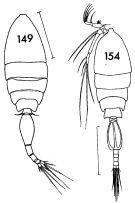 issued from : F.C. Ramirez in Contr. Inst. Biol. mar., Buenos Aires, 1969, 98. [p.90, Lam. XVIII, figs. 149, 154]. Female (from off Mar del Plata): 149, habitus (dorsal). Male: 154, habitus (dorsal). Scale bars in mm: 0.3 (149, 154)
|
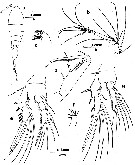 issued from : G.A. Boxshall in Bull. Br. Mus. nat. Hist. (Zool.), 1977, 31 (3). [p.146, Fig.22]. As Conaea gracilis. Female (from 18°N, 25°W): a, habitus (dorsal); b, A1 (ventral); c, Md (anterior); d, Mxp (anterior); e, P1 (posterior); f, Mx1 (posterior; g, P2 (posterior). Nota: Prosome about 1.6 times longer than urosome. Genital complex about as long as rest of urosome including caudal rami. Caudal rami 1.1 to 1.2 times longer than broad. A1 6-segmented, 3rd segment constituting half the length of the appendage. A2 3-segmented; 1st segment armed with an inner seta and a row of spinules on the inner margin; 2nd segment with a proximal row of spinules on the inner margin and a distal row of setules on the outer margin; 3rd segment elongate bearing a large seta and 2 spinules proximally, a row of denticles on the anterior surface and an apical group of 4 setae and a spinule. Md with armature comprising 2 terminal blades each with a row of spinules, an outer spinulate seta and an inner hirsute seta. Mx1 bilobed; outer lobe bearing 3 setae apically, inner lobe with 2 apical and 1 lateral seta. Mx2 2-segmented; distal segment terminating in a large spinulate process and bearing a hirsute seta, a spine armed with 2 rows of spinules and a small setule. P5 reduced to a single plumose seta on the surface of the 1st urosome segment.
|
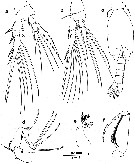 issued from : G.A. Boxshall in Bull. Br. Mus. nat. Hist. (Zool.), 1977, 31 (3). [p.147, Fig.23]. As Conaea gracilis. Female: a, P3 (posterior); b, P4 (posterior); d, A2 (anterior); e, Mx2 (anterior). Male: c, urosome (ventral); f, Mxp (anterior). Urosome 6-segmented. Genital complex about 1.7 times longer than rest of urosome. Caudal rami similar in length to anal somite and about 1.7 times longer than broad. A1 4-segmented. 2nd segment of Mxp with a row of fine spinules along the inner margin divided into 2 rows proximally and with 2 slender unarmed setae; terminal segment forming an unarmed claw.
|
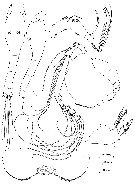 issued from : G.A. Heron in Antarct. Res. Ser. Washington, 1977, 26. [p.89, Fig.30, d-j]. Female: d, habitus (lateral; scale bar: X); e, posterior of last prosomal segment and urosome (lateral; scale bar: Y); f, urosome (dorsal; scale bar: Y); g, right A1 (scale bar: Y); h, left A2 (scale bar: Y); i, labrum (scale bar: Z); j, right Md (scale bar: Z).
|
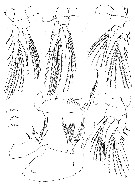 issued from : G.A. Heron in Antarct. Res. Ser. Washington, 1977, 26. [p.91, Fig.31, a-g]. Female: a, left Mx1 (scale bar: Z); b, right Mx2 (scale bar: Z); c, left Mxp (scale bar: Y); d-g, P1 to P4 (scale bar: Y). Nota: 3rd endopdal segment of P2 bearing 3 setae and 1 spine.
|
 issued from : G.A. Heron in Antarct. Res. Ser. Washington, 1977, 26. [p.88, Table 7]. Armature of swimming legs P1-P4. Si : inner sete; St = terminal setae; Se = outer setae. Roman numerals: spines; arabic numerals: setae.
|
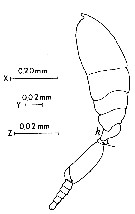 issued from : G.A. Heron in Antarct. Res. Ser. Washington, 1977, 26. [p.91, Fig.31, h]. Male: habitus (lateral; scale bar: X)
|
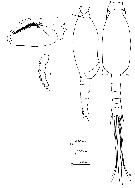 issued from : G.A. Heron in Antarct. Res. Ser. Washington, 1977, 26. [p.92, Fig.32, a-d]. Male: a, posterior of last prosomal segment and urosome (lateral; scale bar: Y); b, urosome (dorsal; scale bar: Y); c, left Mxp (scale bar: Y); d, endopod of P1 (scale bar: Y).
| | | | | Compl. Ref.: | | | Cleve, 1904 a (p.188); Pearson, 1906 (p.35); Hardy & Gunther, 1935 (1936) (p.193, Rem.); Sewell, 1948 (p.515); Grice, 1963 a (p.496); Gaudy, 1963 (p.62, Rem.); Unterüberbacher, 1964 (p.35); Delalo, 1968 (p.139); Vaissière & Séguin, 1980 (p.23, tab.2); Vives & al., 1975 (p.57, tab.II, XII); Vives, 1982 (p.296); Kovalev & Shmeleva, 1982 (p.86); Lozano Soldevilla & al., 1988 (p.61); Hopkins & Torres, 1988 (tab.1); Böttger-Schnack, 1996 (p.1086); Errhif & al., 1997 (p.422); Razouls & al., 2000 (p.343, Appendix); Nishibe & Ikeda, 2004 (p.931, Tab. 2); Fabian & al., 2005 (p.179, fig.4); Galbraith, 2009 (pers. comm.); Nishibe & al., 2009 (p.491, Table 1: seasonal abundance); Böttger-Schnack & Schnack, 2009 (p.140: Rem.); Licandro & Icardi, 2009 (p.17, Table 4); Mazzocchi & Di Capua, 2010 (p.429); in CalCOFI regional list (MDO, Nov. 2013; M. Ohman, comm. pers.); Bonecker & a., 2014 (p.445, Table II: frequency, horizontal & vertical distributions); Dias & al., 2018 (p.1, Tables 4, 5: % vs. season); | | | | NZ: | 19 + 1 doubtful | | |
|
Distribution map of Conaea rapax by geographical zones
|
| | | | | | | | | | | | | | |  issued from : R. Stephen in Mahasagar, 1988, 21 (1). [p.40, Fig.4]. issued from : R. Stephen in Mahasagar, 1988, 21 (1). [p.40, Fig.4].
Distribution of Conaea rapax in the Indian Ocean. |
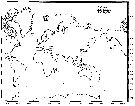 issued from : G.A. Heron & B.W. Frost in Proc. Biol. Soc. Washington, 2000, 113 (4). [p.1061, Fig.25]. issued from : G.A. Heron & B.W. Frost in Proc. Biol. Soc. Washington, 2000, 113 (4). [p.1061, Fig.25].
Locality records for selected species of Conaea.
Records include previously published personal observations and data presented in this study (p.1023, Table 3). |
 Issued from : A.C.T. Bonecker, A. V. de Araujo, C.O. Dias, M.M.S. Castro, P.F. Carvalho, R.M. Lopes & S.C.L. Bonecker in A.P.C. Falcao & D.L. Moreira (ed.) Ambiente pelagico caracterizaçao ambiental regional de Bacia de Campos, Atlantico Sudoeste. Rio de Janeiro. Elsevier. 2017, v.5, p.247-281. [p.261, Fig.10] Issued from : A.C.T. Bonecker, A. V. de Araujo, C.O. Dias, M.M.S. Castro, P.F. Carvalho, R.M. Lopes & S.C.L. Bonecker in A.P.C. Falcao & D.L. Moreira (ed.) Ambiente pelagico caracterizaçao ambiental regional de Bacia de Campos, Atlantico Sudoeste. Rio de Janeiro. Elsevier. 2017, v.5, p.247-281. [p.261, Fig.10]
Abundance (ind. m-3) sampled during night and day into four water masses in the Campos Basin (Brazil).
AT: Tropical water; ACAS: Central water of South Atlantic; AIA: Intermediate water of Antarctica; ACS: Deep water Circumpolar water superior.
Sampling at station c (22°54'30''S, 40°43'W), depth 1900 m (end of the continental slope). |
| | | | Loc: | | | Antarct. (SW Atlant., Weddell Sea, SW Pacif.), South Georgia, sub-Antarct. (SW Pacif.), South Africa (E), Namibia, G. of Guinea, off Cape Verde Is., Canary Is., Morocco-Mauritania, off Madeira Is., N Argentina, Brazil (.., Campos Basin),, Caribbean Sea, Caribbean Colombia, Caribbean, off Florida, Bermuda, off Delaware Bay, Bay of Biscay, off W Ireland, Porcupine Bank, Faroe Channel, Ibero-moroccan Bay, Medit. (Alboran Sea, Ligurian Sea, Tyrrhenian Sea, Ionian Sea, Adriatic Sea, Lebanon Basin), Red Sea, Indian, S Indian (subtropical convergence), Indonesia-Malaysia, E Taiwan, Japan (Tosa Bay, Kuroshio & Oyashio regions), Australia (Great Barrier), off N New Zealand, Pacif. (equatorial), Fidji Is., off Galapagos, NE Pacif. (off Washington, Washington inland, California: San Pedro Bay) | | | | N: | 37 | | | | Lg.: | | | (34) F: 0,96; M: 0,87; (38) F: 1,14-1,12; M: 1,02-1; (46) F: 1,15-1; M: 0,9-0,8; (59) F: 1,16-1; M: 1-0,8; (254) F: 1; M: 0,85; (432) F: 1,15; (679) F: 1; 0,9; M: 0,9; 0,78; (681) [Pacif. SW] F: 1,05-1,02; M: 0,94; [Pacif. NE] F: 1,14-0,97; M: 1-0,87; (848) F: 0,97-1,14; M: 0,87-1; (866) F: 1,03; M: 0,78; {F: 0,90-1,16; M: 0,78-1,02} | | | | Rem.: | Bathypelagic.
Sampling depth (Antarct., sub-Antarct.) : 0-600; 750-2000 m.
According to Owre & Foyo (1967, p.112) this species is relatively rare at one Caribbean station, with 99 p. cent occurring between 439 and 877 m, and common at the other stations where the majority was caught between 500 and 750 m; the overall range was 250-1750 m (females far outnumbered males.
The authors do not agree on the synonymy between Conaea rapax and Antaria gracilis from Dana, 1849 (insufficient description according to Giesbrecht, 1892), whereas A. Scott (1909) considers this form as a junior synonymy. For Heron (1977) the two species are different contrary to the opinion of Boxshall (1977 a). | | | Last update : 26/06/2020 | |
| | | | The synonymy of Conaea rapax Giesbrecht with Conaea aestus Oliveira, 1946 is questionable. For more information see my detailed comments in the species site of C. aestus in the WoRMS database.
| |
|
|
|
 Any use of this site for a publication will be mentioned with the following reference : Any use of this site for a publication will be mentioned with the following reference :
Razouls C., Desreumaux N., Kouwenberg J. and de Bovée F., 2005-2026. - Biodiversity of Marine Planktonic Copepods (morphology, geographical distribution and biological data). Sorbonne University, CNRS. Available at http://copepodes.obs-banyuls.fr/en [Accessed January 31, 2026] © copyright 2005-2026 Sorbonne University, CNRS
|
|
 |
 |













